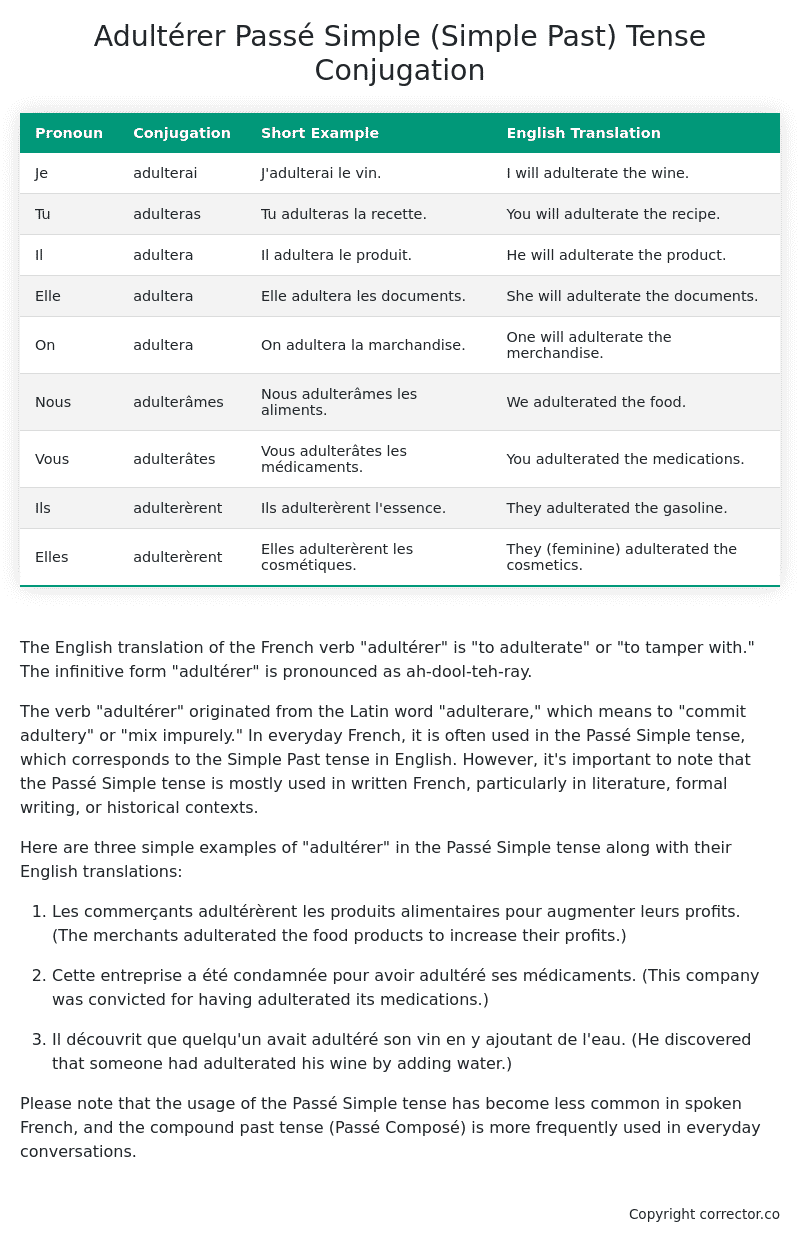Passé Simple (Simple Past) Tense Conjugation of the French Verb adultérer
Introduction to the verb adultérer
The English translation of the French verb “adultérer” is “to adulterate” or “to tamper with.” The infinitive form “adultérer” is pronounced as ah-dool-teh-ray.
The verb “adultérer” originated from the Latin word “adulterare,” which means to “commit adultery” or “mix impurely.” In everyday French, it is often used in the Passé Simple tense, which corresponds to the Simple Past tense in English. However, it’s important to note that the Passé Simple tense is mostly used in written French, particularly in literature, formal writing, or historical contexts.
Here are three simple examples of “adultérer” in the Passé Simple tense along with their English translations:
-
Les commerçants adultérèrent les produits alimentaires pour augmenter leurs profits.
(The merchants adulterated the food products to increase their profits.) -
Cette entreprise a été condamnée pour avoir adultéré ses médicaments.
(This company was convicted for having adulterated its medications.) -
Il découvrit que quelqu’un avait adultéré son vin en y ajoutant de l’eau.
(He discovered that someone had adulterated his wine by adding water.)
Please note that the usage of the Passé Simple tense has become less common in spoken French, and the compound past tense (Passé Composé) is more frequently used in everyday conversations.
Table of the Passé Simple (Simple Past) Tense Conjugation of adultérer
| Pronoun | Conjugation | Short Example | English Translation |
|---|---|---|---|
| Je | adulterai | J’adulterai le vin. | I will adulterate the wine. |
| Tu | adulteras | Tu adulteras la recette. | You will adulterate the recipe. |
| Il | adultera | Il adultera le produit. | He will adulterate the product. |
| Elle | adultera | Elle adultera les documents. | She will adulterate the documents. |
| On | adultera | On adultera la marchandise. | One will adulterate the merchandise. |
| Nous | adulterâmes | Nous adulterâmes les aliments. | We adulterated the food. |
| Vous | adulterâtes | Vous adulterâtes les médicaments. | You adulterated the medications. |
| Ils | adulterèrent | Ils adulterèrent l’essence. | They adulterated the gasoline. |
| Elles | adulterèrent | Elles adulterèrent les cosmétiques. | They (feminine) adulterated the cosmetics. |
Other Conjugations for Adultérer.
Le Present (Present Tense) Conjugation of the French Verb adultérer
Imparfait (Imperfect) Tense Conjugation of the French Verb adultérer
Passé Simple (Simple Past) Tense Conjugation of the French Verb adultérer (You’re reading it right now!)
Passé Composé (Present Perfect) Tense Conjugation of the French Verb adultérer
Futur Simple (Simple Future) Tense Conjugation of the French Verb adultérer
Futur Proche (Near Future) Tense Conjugation of the French Verb adultérer
Plus-que-parfait (Pluperfect) Tense Conjugation of the French Verb adultérer
Passé Antérieur (Past Anterior) Tense Conjugation of the French Verb adultérer
Futur Antérieur (Future Anterior) Tense Conjugation of the French Verb adultérer
Subjonctif Présent (Subjunctive Present) Tense Conjugation of the French Verb adultérer
Subjonctif Passé (Subjunctive Past) Tense Conjugation of the French Verb adultérer
Subjonctif Imparfait (Subjunctive Imperfect) Tense Conjugation of the French Verb adultérer
Subjonctif Plus-que-parfait (Subjunctive Pluperfect) Tense Conjugation of the French Verb adultérer
Conditionnel Présent (Conditional Present) Tense Conjugation of the French Verb adultérer
Conditionnel Passé (Conditional Past) Tense Conjugation of the French Verb adultérer
Conditionnel Passé II (Conditional Past II) Tense Conjugation of the French Verb adultérer
L’impératif Présent (Imperative Present) Tense Conjugation of the French Verb adultérer
L’impératif Passé (Imperative Past) Tense Conjugation of the French Verb adultérer
L’infinitif Présent (Infinitive Present) Tense Conjugation of the French Verb adultérer
L’infinitif Passé (Infinitive Past) Tense Conjugation of the French Verb adultérer
Le Participe Présent (Present Participle) Tense Conjugation of the French Verb adultérer
Le Participe Passé (Past Participle) Tense Conjugation of the French Verb adultérer
Struggling with French verbs or the language in general? Why not use our free French Grammar Checker – no registration required!
Get a FREE Download Study Sheet of this Conjugation 🔥
Simply right click the image below, click “save image” and get your free reference for the adultérer Passé Simple tense conjugation!

Adultérer – About the French Passé Simple (Simple Past) Tense
Formation
Usage
Narration
Historical Context
Interactions with other tenses
Passé Composé
Imparfait
Conditional and Subjunctive
Summary
I hope you enjoyed this article on the verb adultérer. Still in a learning mood? Check out another TOTALLY random French verb conjugation!


